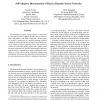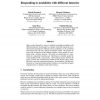458 search results - page 80 / 92 » Q-Decomposition for Reinforcement Learning Agents |
AAAI
2008
13 years 10 months ago
2008
Off-policy reinforcement learning is aimed at efficiently reusing data samples gathered in the past, which is an essential problem for physically grounded AI as experiments are us...
SASO
2008
IEEE
14 years 2 months ago
2008
IEEE
The distribution of data in large dynamic wireless sensor networks presents a difficult problem due to node mobility, link failures, and traffic congestion. In this paper, we pr...
NIPS
2004
13 years 9 months ago
2004
Motor control depends on sensory feedback in multiple modalities with different latencies. In this paper we consider within the framework of reinforcement learning how different s...
IIE
2007
13 years 7 months ago
2007
We investigate the possibility to apply a known machine learning algorithm of Q-learning in the domain of a Virtual Learning Environment (VLE). It is important in this problem doma...
CCIA
2009
Springer
13 years 8 months ago
2009
Springer
Abstract. Social conventions are useful self-sustaining protocols for groups to coordinate behavior without a centralized entity enforcing coordination. The emergence of such conve...


